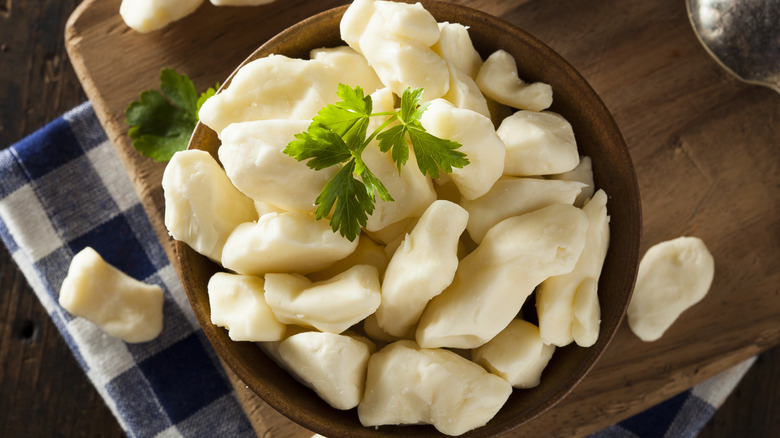Can You Freeze Cheese Curds?
You don't have to be from Wisconsin to know that cheese curds are some of the most addictive and delicious things on the planet. Whether you fry them up, add them to poutine (Canada's most famous dish), or eat them straight from the bag, there's just something undeniably delectable about these small chunks of cheese. Of course, it helps that they're bite-sized, available in numerous flavors, and make an adorable squeak when you bite into them.
So naturally, when you find these beauties at your local store or online, you're likely to want to stock up. Unfortunately, cheese curds don't stay good forever and will only stay fresh for about a week in the fridge. That said, don't let that stop you from stocking up on these squeaky little cheese snacks because if you need to store them for a long time, you can always freeze them! Yep, you can absolutely freeze cheese curds, and they will stay fresh for up to four months. However, it's important to store them properly to prevent freezer burn and keep them from picking up extra flavors from your freezer.
Optimally, vacuum-sealing your curds is the best way to keep them fresh in the freezer and away from extra moisture and air. In lieu of that, though, an airtight container or freezer bag will work in a pinch. In fact, it's pretty easy to remove excess air from freezer bags by dipping it in water up to the top before sealing it. Just keep in mind that after freezing, your cheese curds can lose a bit of their squeak, but they'll still be super tasty.
Cheese curds are a natural part of the cheesemaking process
Cheese curds might seem like their own type of unique cheese, but they're actually an intrinsic part of the cheesemaking process. Typically, when curds are formed, they're separated from the whey, a slightly sour liquid that's formed when milk is curdled, and shaped into blocks or wheels that we'd recognize as cheese. However, these fresh curds can also be eaten as is, and their freshness gives them a distinctly more milk-forward flavor than aged varieties. In the United States, the most common types of curds you'll find are made from cheddar.
As for why they're so squeaky when you bite into them, this has to do with how fresh they are. The squeak itself is caused by proteins that create a slightly spongey texture that, when bitten into, creates vibrations that produce sound as they spring into place. When the curds age, the acid in the cheese breaks down these squeaky proteins, causing them to lose their iconic sound. However, if your curds aren't very old, you can return some of their lost squeaks by heating them for a few seconds in the microwave.
Of course, not everyone is after the squeak, especially since cheese curds melt so well, which is one reason why they're so popular as a deep-fried snack. They can also be used to make a super cheesy Juicy Lucy burger that is to die for. Just remember to keep extra napkins handy because it will get messy!

